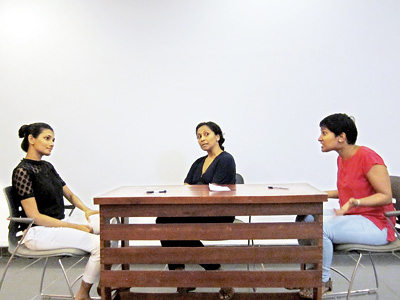Looking back in anger
On the outskirts of Santiago in Chile, where Villa Grimaldi once stood, there is now a park. In the mid-1970s, it became infamous as a camp where thousands of political prisoners were subjected to interrogations and worse by the Dirección de InteligenciaNacional or DINA -Augusto Pinochet’s secret police. Chile’s current President Michelle Bachelet knows this place – her father Air Force Brigadier General Alberto Bachelet Martínez succumbed to a cardiac arrest here after prolonged torture in 1974. Subsequently Bachelet and her mother would also be detained and tortured here for a time.But today, in the spring, flowers bloom in the park.

Confronting the past: Thanuja Jayewardene, Indika Senanayake and Nushelle de Silva
“It’s really awkward,” admits Guillermo Calderón frankly. “You think, ‘I am ready to have a picnic here. Is that right or wrong?’” The Chilean playwright and director is in Sri Lanka to stage his play Villa this week and the script is the result of his fascination with the complexities and controversies of memorialisation.
When the curtain rises on Villa it reveals three women who make up a special committee appointed to determine the fate of the camp. They are voting on which option to proceed with: a) reconstruct the villa like it was; or option b) build a museum. There have been other committees before this one, but none have been able to reach a decision.
Calderón says the choice to make his committee an all-female one is entirely deliberate. “Women were detained as much as men, but they were singled out, because they were raped. There is something about rape that makes it more insidious,” he says. More than men, women felt the shame and stigma around their torture, a situation made more painful for those who were impregnated by their rapists. In Calderón’s experience, women also seemed more likely to come together in survivors’ groups and to drive attempts to memorialise and confront that history.
Indika Senanayake, a graduate of Columbia University’s MFA programme in acting, is a member of the cast and the woman responsible for bringing Villa to Sri Lanka. Senanayake says the all-female cast is wonderful to work with, especially considering the humour that Calderón makes room for in the script.(Joining her on stage for this performance will be actresses Nushelle de Silva and Thanuja Jayawardene.) “There are all these micro-tensions, there are so many little machinations going along,” she notes, explaining that the women are in constant negotiations as their alliances shift. But the script has a deeper hold on her. Senanayake still remembers attending a reading of the play and believing immediately that it would resonate deeply with audiences in Sri Lanka, who might see parallels not just in the past but in the present.
Calderón is frank about what drives him to confront his own country’s history – it is anger. “I grew up through the dictatorship, and I am still bitter about that experience,” he says, describing the “new democracy” that followed as being a very “compromised political process in which a lot of expectations were dismissed.” Where public institutions and systems of governance have failed, art and culture have remained the only platforms that allow for meaningful debate, in however limited a way.
To write the script, Calderón spent a lot of time walking around the site where Villa Grimaldi once stood. He also read all the testimonies and reports he could get his hands on. In the aftermath of the dictatorship which lasted from 1973 and 1990, Chilean authorities produced two significant reports, says Calderón, one of which was dedicated entirely to testimonies and accounts of torture. They made for grim perusal, but the playwright felt compelled to do so anyway. He describes it now as the “worst reading you can do,” saying that victims underwent unimaginable suffering. As part of his research, Calderón also studied the holocaust memorials in Berlin. That process highlighted for him how essential it was that justice must be served before memorialisation can in anyway be meaningful.
At least he does not feel alone in his determination. A new generation of young artists and playwrights in Chile seem determined to grapple with their country’s past, to not look away. “Younger generations have grown up in a democratic context, and they appreciate the freedoms they have, for them it is unimaginable to think that this happened in the same country,” says Calderón, describing the movement as a kind of “backwards indignation.” Moreover there are many who believe that Chile’s challenges in recent times – from the problems with healthcare to the education system – are rooted in the dictatorship.
As the interview winds up, we speak briefly about the choices that some Sri Lankans feel they must make in the aftermath of the conflict – to confront the past or to move forward, the sense that somehow one is bought at the expense of the other. “I side with the people who say, ‘address the past completely, we cannot move forward until we have resolved everything.’”Even though this is what he believes, Calderón knows it is easier said than done, but for him, “there is a dignity in being stuck.”
Villa will be staged at the International Centre for Ethnic Studies on Kynsey Terrace from 8 p.m. onwards on August 14 and 15. Entrance is by invitation only, you can receive yours by writing to villaprojectsrilanka@gmail.com. The performance is made possible by the support of Mario Gomez of ICES and through an On the Road grant from the Theatre Communications Group.


